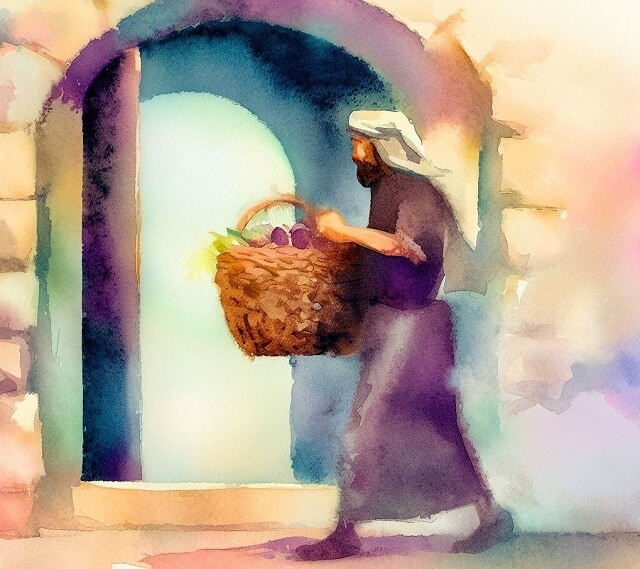
Korach, with his motto, “All the people in the community are holy” (Num. 16:3), contested the idea of a select group dedicated to serving God. After the rebellion was put down — quite literally, as it turned out — God affirmed the nation’s need for Levites and kohanim to serve in the Temple and instruct the people.
Twenty-Four Matnot Kehunah
Since the tribe of Levi was dedicated to fostering the spiritual aspirations of the Jewish people, they were not meant to spend their days working the land. Instead, they were supported through a system of terumot and ma’aserot (tithes). For this reason, the story of Korach’s rebellion is followed by a detailed description of the twenty-four matnot kehunah, gifts bestowed to the kohanim.
Not all people, however, are equally enthusiastic about giving these gifts.
Our eagerness to perform a mitzvah depends on how well we comprehend its goal and purpose. If the objective of a mitzvah is not clearly understood, then its fulfillment will suffer from a lethargic, lackadaisical attitude.
The institution of kehunah, the priesthood, and the various methods of supporting it, will be better appreciated when the entire nation is on a high spiritual level. Only then will we truly recognize the benefit of their influence. And we will realize that our lives are blessed to the extent that we are connected to the spiritual life of the nation.
We may discern three attitudes toward matnot kehunah:
1. Refusal to Tithe
The lowest level is one of outright refusal to support the kohanim. This attitude stems from a spiritual crisis in which one fails to appreciate the benefit of a spiritual life in general, and the positive influence of the kohanim, knowledgeable in God’s Torah, in particular. Such a person lacks a connection to the special covenant of the kehunah and its overall goal, which encompasses all generations of the Jewish people, past, present, and future. This is a terrible tragedy, the result of a profound emptiness and estrangement from Torah.
2. Fulfilling the Letter of the Law
The second attitude is one of disinterest, even neglect. At this level, appreciation for the institution of kehunah is limited to its future place in the lofty state promised to the Jewish people. Since we have not yet merited this long-awaited state, the resulting attitude is to observe the bare minimum, fulfilling only the letter of the law so as not to violate any legal obligations. Such an individual will seek loopholes to avoid tithing, like bringing produce into the house via the roof or the courtyard (see Berachot 35b).
While this outlook is not so callous that it reflects a life tragically distant from Torah, it is still very far from a life of blessing. These individuals have not clarified for themselves the purpose of life. They do not appreciate the true value of eternal goals. They fail to grasp how these goals transcend any particular time, how they form a collective activity composed of the combined service of many generations — beautiful structures built through continuous efforts of Torah and mitzvot over time.
Sadly, with such an attitude, life appears as something that must be accepted against our will. Life’s greatness and vitality, its essential holiness and beauty, are hidden. As long as one’s outlook is so limited, life offers little satisfaction, and the soul will not be content with any of its accomplishments. What good is material success, when life’s inner content is empty, incapable of nourishing our higher feelings and thoughts?
3. The Broad Outlook
The highest level is when one acquires the broader outlook that encompasses the overall expanse of life, embracing all generations and all times. From this viewpoint, the current state of the institution of kehunah is not the decisive factor. The kehunah is respected and cherished due to its future greatness, and from the overall good that comes from the accumulation of all of its contributions in the past, present, and future.
With such an outlook, the nation is ready to receive a profusion of blessings, both spiritual and material. It is with regard to this approach toward tithing that it is written:
“Bring all the tithes to the storehouse, so that there is food in My house. Test Me in this, says the Lord of hosts: if I will not open for you the windows of Heaven, and pour out to you blessing ad bli dai — until there is more than enough.” (Malachi 3:10)
The blessing is extraordinary, encompassing all of life’s material aspects. But its source is the collective blessing that revitalizes life’s inner depths: the blessing of inner peace, enabling us to feel the goodness of life itself. Life is not limited to the flawed present. As a result, nothing is lacking, and we receive unlimited blessings — “ad bli dai.” As the Sages interpreted homiletically: “Until one’s lips are exhausted from protesting: ‘Enough!'” (Shabbat 32b)
(Sapphire from the Land of Israel. Adapted from Ein Eyah vol. III, pp. 183-184)





